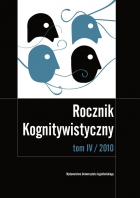Między relatywizmem a uniwersalizmem językowym
Between Linguistic Relativism and Linguistic Universalism
Author(s): Natalia MiklaszewskaSubject(s): Philosophy
Published by: Wydawnictwo Uniwersytetu Jagiellońskiego
Keywords: Cognitive Science
Summary/Abstract: The aim of this paper is to analyze two seemingly contradictory theories, namely: linguistic universalism and linguistic relativism. Undoubtedly, the variety of cultures is associated with the variety of perspectives and ways of perceiving the reality. The question that arises here, is: do we live in totally different worlds, or maybe it is justified to speak about “entities” universal for each and every language? And if the answer for the second question is positive, what can we say about those universals? How do they appear? Are they a part of human mind? One of the possible solutions of this problem is based on the theory of Anna Wierzbicka, who claims that without tertium comperationis (language primitives, which are said to be universal), it would be impossible to communicate with people living in other countries. Wierzbicka’s theory seems to be the perfect compromise between the two views in question.
Journal: Rocznik Kognitywistyczny
- Issue Year: 2010
- Issue No: 4
- Page Range: 119-127
- Page Count: 9
- Language: Polish

